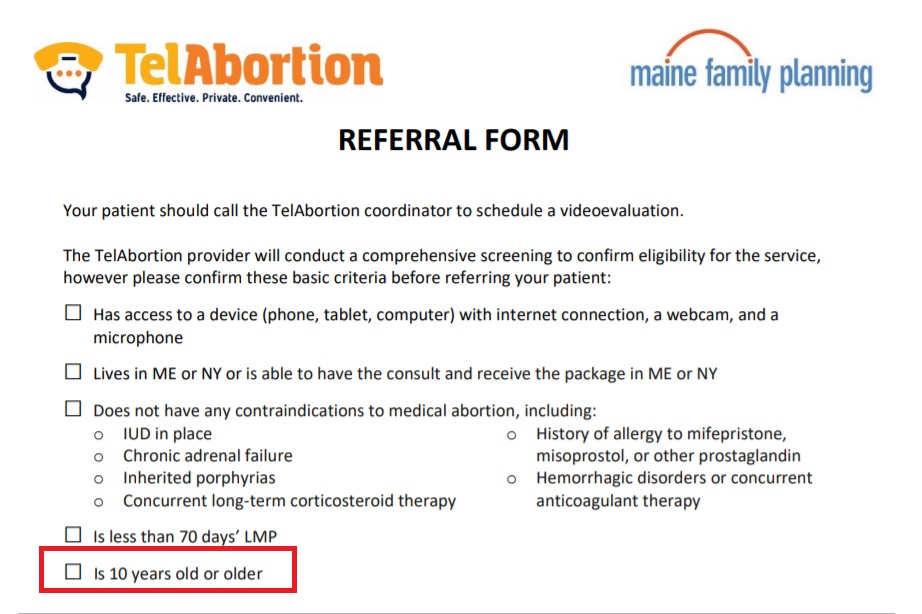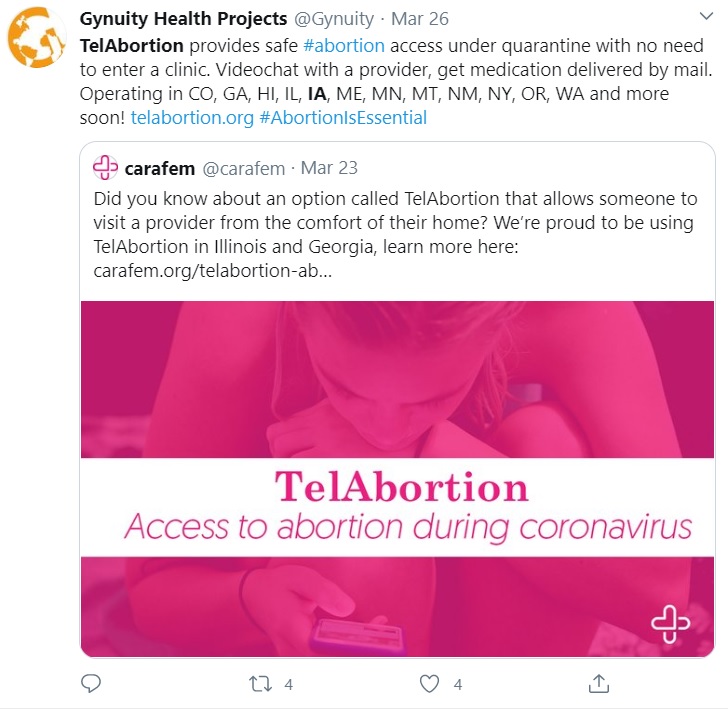There is growing concern that an abortion pill-by-mail clinical trial, which has expanded extensively over the past four years, is actually an effort to thwart important Food and Drug Administration (FDA) safety requirements.
Currently, under a safety system called REMS (Risk Evaluation and Mitigation Strategy), the abortion pill regimen can only be dispensed in an approved clinic or hospital. In theory, clinical trials are used to test a specific drug and hopefully alleviate safety issues that arise. Live Action News previously documented how the TelAbortion clinical trial, set up to “obtain preliminary data on the safety, acceptability, and feasibility of direct-to-consumer telemedicine abortion,” or to ship abortion pills by mail, has been gradually expanding to more states and locations in an obvious workaround to the FDA’s REMS requirements.
However, a new look at this clinical trial indicates this effort has expanded, creeping even further into more states.

Maine FP TelAbortion abortion pill by mail referral recruits ages from 10 years old
When the clinical trial was first announced in July 2015, it had not yet recruited participants or announced locations. Ages of participants were from 11 to 50 years of age. In August 2015, it was announced that the trial would begin in September. However, it didn’t actually begin until months later.
In March of 2016, it was again announced that while there was no one recruited for the study yet, it was supposed to be completed in December 2016. Finally, in August 2016 (a year after it was first announced), the trial began recruiting in just two states and locations: The University of Hawaii Women’s Options (Honolulu) and the Choices Women’s Medical Center (Jamaica, NY). They anticipated 50 participants from age 11 to 50.
But then, the December 2016 completion date got pushed back. By a lot.
By May 2017, researchers had decided that rather than complete the study in December 2016, they would push it back to June of 2018 — 18 months later. In addition, they significantly increased participants, from 50 to 1000, and added two locations: Maine Family Planning (Augusta) and Oregon Health and Sciences University Women’s Health Research Unit (Portland). By October of 2017, all intended dates and enrollment had not changed.
Then, in May 2018, researchers extended the length of the clinical trial again — this time to June of 2019 — and expanded its locations, adding Planned Parenthood Columbia Willamette in Portland, Oregon. The trial was then taking place at five locations in four states (ME, OR, HI, and NY).
And this would continue to happen. In April 2019, the completion date was pushed back another year, to June 2020. Six more locations were added, and the age eligibility expanded — this time including anyone aged 10 to 50. The added locations were:
- Planned Parenthood of the Rocky Mountains in Denver, CO
- Planned Parenthood of the Rocky Mountains in New Mexico
- Planned Parenthood Columbia Willamette in Washington
- Main Family Planning in NYC
- Carafem in Atlanta, GA
- Oregon Health and Sciences University Women’s Health Research Unit in Washington
This meant that by April 2019, the clinical trial had ballooned to 11 locations and eight states (CO, NM, WA, GA ME, OR, HI, NY).
As of yesterday, no updates had been posted to the FDA site since April 2019. As of June 2019, the locations had dropped from eleven to ten, as Choices Women’s Medical Center in Jamaica, NY, was removed. By the end of 2019, there were 10 locations in eight states (CO, NM, WA, GA ME, OR, HI, NY).
However, despite no updates to the FDA website, a view of TelAbortion’s website in March 2020 revealed three new locations were added: Emma Goldman Clinic in Iowa (no city referenced), Planned Parenthood Minnesota, North Dakota, South Dakota (located in MN) , and Planned Parenthood of Montana (in MT). On March 26, trial sponsor Gynuity tweeted additional locations including Illinois, promising “more soon.” But that’s not all.

Gynuity tweets additional TelAbortion states for mail order abortion pill (Image: Twitter)
Abortion facility Carafem’s website claims that study participants with mailing addresses in Georgia, Illinois, and Maryland can receive the pill by mail. To confirm this, a look at the TelAbortion “For Providers” page reveals Carafem in Maryland is also now a location for the study.
This brings total to at least 15 locations in 13 states (MD, IL, IA, MN, MT, CO, NM, WA, GA ME, OR, HI, and NY.)
In July of 2020, Live Action News discovered the recruitment numbers had risen to 2,500 and the completion date was again moved to June of 2022. In addition, the trial now reached 13 states plus the District of Columbia (CO, DC, GA, HI, IL, IA, ME, MD, MN, MT, NM, NY, OR, WA) in 16 locations.
In addition, in October of 2020, Gynuity filed a new trial (“to obtain data on the safety, acceptability, and feasibility of providing abortion by direct-to-patient telemedicine and mail”) which seems to mirror the original trial but is set to take place through October 2022.
In other words, a clinical trial first published in 2015 starting with recruiting 50 participants in two states has now expanded:
- From 50 to 2,500 participants (possibly many more than this)
- From two to 13 states
- From two to 15 (and growing) locations
- From ages 11-50 to 10-50
- From December 2016 to June 2022 (possibly to be extended further)
- A new trial was published to take place through October of 2022.
In other words, a clinical trial first published in 2015 starting with recruiting 50 participants in two states has now expanded:
- From 50 to 1,000 participants (possibly many more than this)
- From two to 13 states
- From two to 15 (and growing) locations
- From ages 11-50 to 10-50
- From December 2016 to June 2020 (possibly to be extended further)
This appears to be a purposeful workaround. In June of 2019, Erica Chong, listed as the Principal Investigator of the trial, was interviewed by the online media group Fast Company, which reported:
TelAbortion obviously cannot expand into states where telemedicine abortion is illegal, but one workaround Chong is exploring is to introduce the program in neighboring states. “If we can get into a neighboring state, it’s possible for a woman in Texas, for example, to maybe cross the border into New Mexico,” Chong says. “She can have her consult there, and then pick up her package at a Fedex office that’s holding the package for her, or something like that.”
Fast Company noted, “The hope is to get enough providers on board so TelAbortion can eventually go from research study to full-blown service.”
While the FDA has acted to protect the public from other sham operations and dangerous drugs, they seem eerily quiet while this trial grows. It is also a huge conflict of interest, given the cozy connection the sponsor has to the abortion pill’s manufacturer. Gynuity is funded by the Packard Foundation and the Buffett Foundation, original business investors of abortion pill manufacturer DANCO Laboratories, as well as the Population Council and Planned Parenthood. Gynuity is also funded by Ibis Reproductive Health (see 2017 990 report and their website), which, as recently as January 2020, was directly funded by abortion pill manufacturer, DANCO Laboratories.
Editor’s Note, 1/13/21: This article has been updated.
“Like” Live Action News on Facebook for more pro-life news and commentary!







